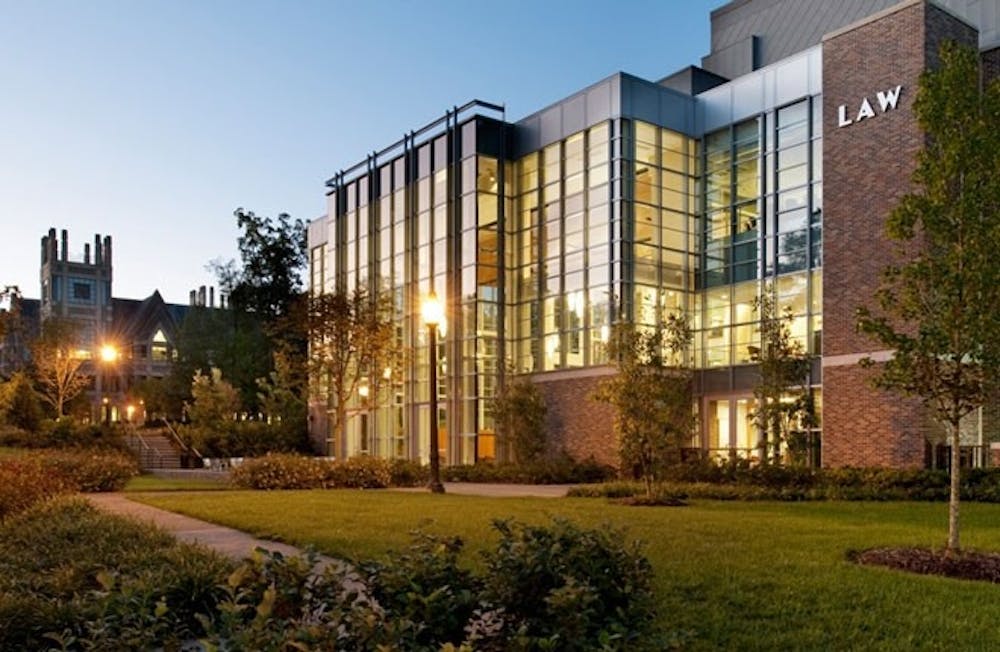Jonathan Butler, a graduate student at the University of Missouri who went on hunger strike earlier this month to draw administrative attention to racial issues, spoke to a supportive audience of approximately 120 students and faculty at the School of Law Friday.
Butler—who was joined by Payton Head, Missouri's student body president—has been in the national spotlight since he began a hunger strike on Nov. 2 and refused to eat until Missouri's president, Tim Wolfe, resigned one week later. During the 45-minute conversation, Butler and Head explained their experiences as black students at Missouri before fielding questions about race relations on college campuses and what Butler described as the “social and political revolution” taking place across the country.
"We’re speaking up, and we’re inspiring people around the nation to have this conversation that is sometimes difficult,” Head said.
Head said he thought his school had been misrepresented by the media in the past few weeks, adding that he believes Missouri is a better place than the media is portraying it to be.
“I want people to know that Mizzou is a place where there is so much love,” he said. “I think what sells is selling Mizzou as this hotbed of racial harassment and racial injustice. This is not just a Mizzou or Missouri issue, it’s a national issue. It's even more important to acknowledge that something is being done."
Head noted that this was the first time he and Butler were talking to students outside of Missouri.
“This is actually our first school that we’ve been to visit,” Head said. “Of course we’ve been having these conversations for a while, and I’ve talked to a couple of classes at Mizzou about some of these issues, but we've never been to a different university.”
Many of the questions focused on student activism, putting pressure on university administrators and being faculty allies to black students.
“What I appreciated about [the discussion] was there was a lot of specific advice and sharing, so that each person who was interested in taking a part could take something valuable and implement it right away,” said Ajenai Clemmons, a first-year Ph.D. student at the Sanford School of Public Policy. “There were very concrete steps for anybody in any role, whether they are students, staff or faculty. They can be supportive of similar movements wherever they are at.”
The conversation was hosted by the Duke Black Graduate and Professional Student Association, the School of Law and the Center on Law, Race and Politics. It was part of Duke Law’s civil rights conference, which is taking place Friday and Saturday and is hosting law professors from around the country.
The speakers were introduced by Guy-Uriel Charles, senior associate dean for faculty and research at the Law School, and the forum was facilitated by Seth Pearson, third-year law student and BGPSA president.
“I’m going to continue to work with the administration to push forward the Black Graduate and Professional Student Association, and with admissions, to help more students feel more included in the life of this university,” Pearson said.
Danielle Purifoy, a Ph.D. student in environmental policy, linked Head's and Butler’s work to the campus conversation that took place at 5 p.m. Friday. Purifoy and Pearson were among the organizers of a Nov. 13 rally to show solidarity for student protestors at Missouri.
“I think that the work of these black students is completely undervalued and misunderstood,” Purifoy said. “Our freedom, our safety, our inclusion, is all bound up together. If we have any hope of getting there, we have to be a lot more aware of our history, about what Duke is, where it came from and where it can go from here.”
Get The Chronicle straight to your inbox
Signup for our weekly newsletter. Cancel at any time.

